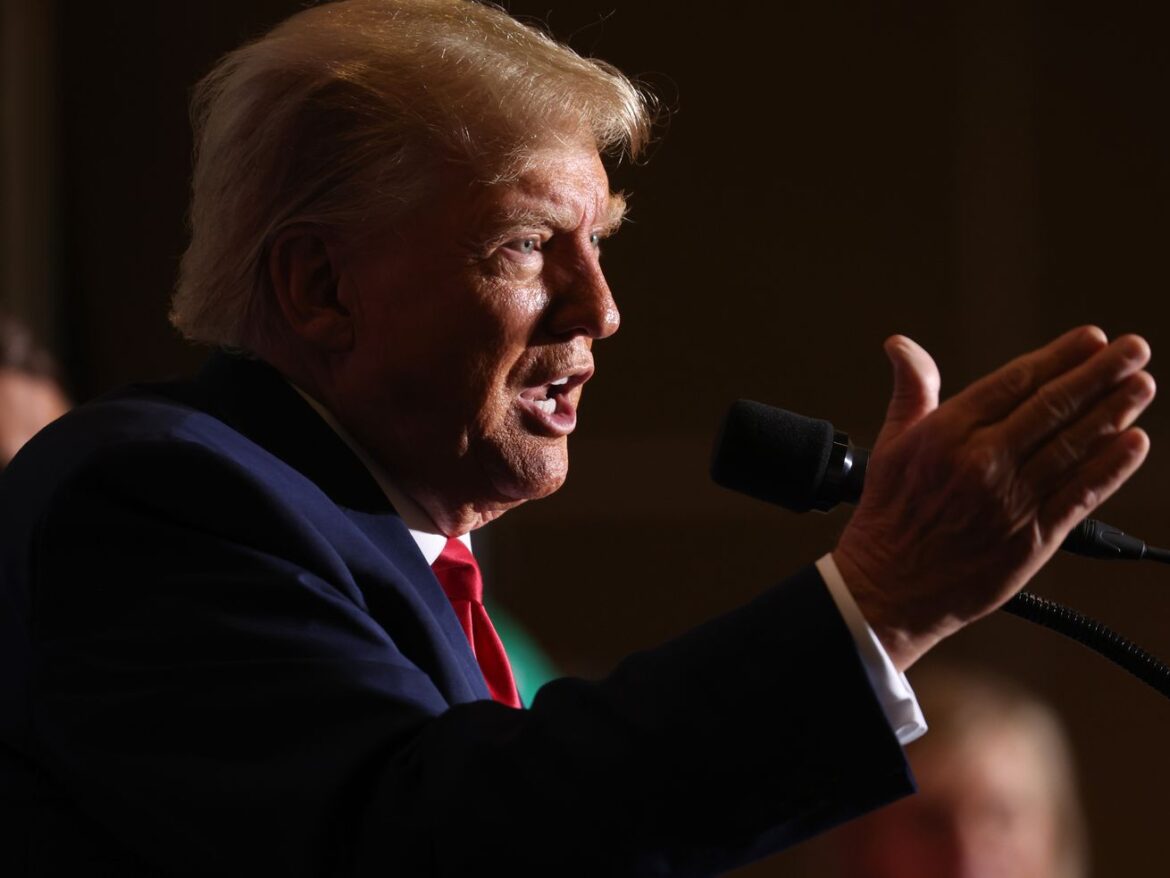It’s the fourth time that Trump has been indicted.
Former President Donald Trump was indicted for an unprecedented fourth time on Monday for trying to overturn the 2020 election results in Georgia, adding a new complication to his mounting list of legal troubles — one that, should he be found guilty, could lead to a significant fine, and even prison time.
Trump was charged with racketeering under Georgia law for scheming to steal the election from President Joe Biden, who won the state by less than 12,000 votes. If convicted, Trump could face between five and 20 years in prison and fines up to $250,000 or three times the amount of any pecuniary value he gained from the scheme to interfere in the election results. He is now the first former president to be indicted in Georgia — and remains the first former president to be indicted at all.
Trump recently faced new charges related to his involvement in the January 6, 2021, insurrection and his attempts to overturn the 2020 election following a separate probe led by Department of Justice special counsel Jack Smith, who is also leading Trump’s prosecution in another case for retaining classified documents after he left office.
That’s in addition to Trump’s indictment in New York over hush money payments made to the porn actor Stormy Daniels during his 2016 campaign and a federal indictment for mishandling sensitive classified documents after he left office. In total, Trump has now been indicted in four separate cases.
Much like the January 6 indictment, the latest one has overt consequences for US democracy and the upcoming 2024 election. If Trump faces no legal repercussions for his interference in the 2020 election, in both the Georgia case and in the latest federal case, the question is whether he, or his allies, will try to overturn the results a second time if he loses.
Here’s what you need to know about the latest charges and what comes next.
What are the charges?
The charges are the result of a more than two-year investigation by the Fulton County district attorney’s office, and come after a Georgia special grand jury report on Trump’s interference in the 2020 election that recommended prosecutors seek charges based on interviews with 75 witnesses.
To convict Trump, Georgia prosecutors would have to prove the existence of a racketeering “enterprise” and a pattern of racketeering based on at least two “qualifying” crimes. Racketeering is a form of organized criminal activity that involves operating illegal schemes (such as extortion or trying to overturn an election), often in a systematic and coordinated manner, by using intimidation, coercion, and manipulation. It’s a serious charge of which members of groups ranging from the mafia to FIFA have been convicted.
Under Georgia law, a racketeering enterprise is the vehicle through which racketeering happens. It’s defined as a person, business, legal entity, group, or association, and can be either legitimate or illegal. There are dozens of qualifying crimes for purposes of bringing racketeering charges, from homicide to insurance fraud. In this case, the qualifying crimes include “influencing witnesses” — namely, Georgia Secretary of State Brad Raffensperger, who Trump had asked to “find” the votes he needed to win the state.
The second qualifying crime is computer trespass in connection to a voting machine breach in Coffee County. At the direction of then-Trump lawyer Sidney Powell, Trump operatives in the state accessed the voting machines, copied their data, and uploaded it online so that election deniers could use it in challenging the election results. Notably, the machines were operated by Dominion Voting Systems, which reached a $787 million settlement with Fox News earlier this year over claims that the network had defamed the company by boosting lies about it rigging the election against Trump.
State law doesn’t require that Trump be prosecuted for those crimes in order for him to be convicted of racketeering — just that prosecutors demonstrate that he tried to solicit or coerce those crimes. That makes the state’s racketeering statute more expansive than its federal counterpart, which means that the burden of proof may be easier to meet than if racketeering charges were brought on the federal level.
Will Trump go to jail? What about to prison?
Trump is not expected to be jailed following his arraignment, following a pattern established by his previous arraignments in New York, Miami, and Washington. Trump was previously fingerprinted in those cases but was not put in handcuffs and did not have his mugshot taken. There were cameras allowed in the courtroom in New York, but not in Miami or DC. He was also allowed to return home following each arraignment.
As for prison, it’s not a good sign for Trump that Georgia prosecutors have had a number of sweeping racketeering successes in the last year. In April, more than 100 alleged gang members were indicted for charges including racketeering. In June, seven gang members were convicted of racketeering in a separate case after they broke into more than 50 cars over the course of a few months. That said, Trump will be presumed innocent until proven guilty like any defendant, and this indictment does not necessarily mean he will go to prison.
What does this mean for Trump’s 2024 campaign?
With four indictments now to Trump’s name, there’s a question as to whether any number would dissuade Republican voters from continuing to support him as their standard-bearer. He remains the frontrunner in the GOP primary, polling nearly 40 percentage points on average ahead of Republican Florida Gov. Ron DeSantis.
Whit Ayres, a Republican pollster, notes that previous indictments were easy for GOP voters to dismiss, and suggested the latest indictment will likely follow that trend.
Many legal analysts have said Trump’s first indictment in New York has weak underpinnings, and Manhattan District Attorney Alvin Bragg had previously boasted about how many times he had sued the Trump administration during his campaign. Together, those factors left many Republicans waving away that indictment as a “partisan witch hunt.”
The second, in the case concerning Trump’s retention of classified documents after he left office, was a “blockbuster legally,” Ayres said, but given Bragg’s indictment had come before it, was easy for Republicans to brush it off yet again.
It’s difficult to know exactly what will happen now that Trump has been indicted for a fourth time. The charges in the Georgia case are serious and have direct implications for democracy, given that Trump has repeatedly refused to commit to accepting the results of the 2024 election when asked directly. While Republican voters may support that, it’s unclear whether it will cause moderates and independents to turn away from the former president.
Trump has already lost once to President Joe Biden, but head-to-head matchups in key states polled over the last month, suggest a close race. Early August polls showed Trump ahead by 2 percentage points in Arizona, the two men tied in Michigan, and Biden ahead by 3 percentage points in Virginia. Much could change before November 2024, but should Trump be his party’s nominee, those numbers suggest a tight race in which losing moderates and independents in states like Georgia or Pennsylvania could be the difference between victory and defeat.
Overall, even in the best-case scenario for the former president, in which the legal issues have zero effect on his support, the cases will take away valuable time and money he could be spending on his campaign.
What happens next?
As with the cases against Trump in New York, Florida, and DC, the Georgia case could extend well into the 2024 campaign season — or even beyond the election.
If Trump wins the 2024 election, any unresolved federal charges would likely become moot under the longstanding DOJ policy that a sitting president cannot be indicted. But it’s not clear whether the same would be true for the state charges levied in the New York and Georgia cases. And if Trump were to be convicted of any of the charges, state or federal, that would also create a constitutional question: whether Trump could later pardon himself.



